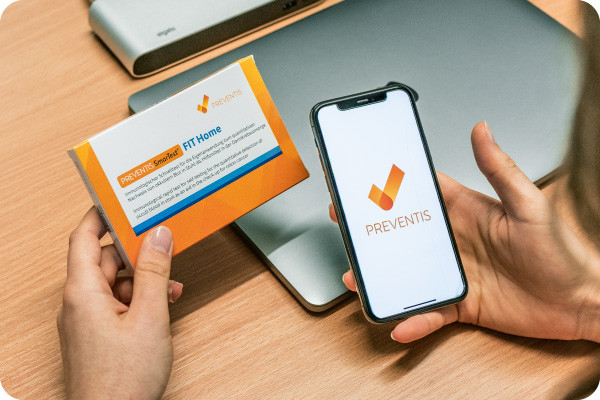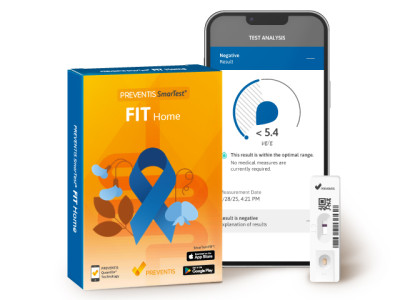Introduction
Colorectal cancer is one of the most common cancers – but it is also one of the most preventable. Detected early, bowel cancer is almost always curable.[1,2] And this is where modern technology comes into play: with the Preventis SmarTest® FIT Home, a self-test for colorectal cancer, screening is easier than ever. No doctor's appointment, no laboratory, no more waisting time. Simply at home, with an app on your smartphone.
In this article, we show you why the at home FIT test is a real innovation, what sensitivity and specificity really mean and how your smartphone can help protect your life. We also take a look at the latest study results – including a major study by the German Cancer Research Center (DKFZ).
Why colorectal cancer screening is so important
Every year, around 54,000 people in Germany are diagnosed with colorectal cancer.[3] The good news is that colorectal cancer develops slowly – over a period of years from so-called precancerous stages (adenomas). Detecting these at an early stage can prevent real cancer.[4]
This is why health insurance companies recommend regular bowel cancer screening from the age of 50 – even earlier if there is a family history of the disease. However, many people postpone screening due to fear of a colonoscopy or a lack of time. This is where the smartphone based stool test comes in.
SmarTest FIT® – colorectal cancer test at home
With the SmarTest FIT®, you can do your bowel cancer screening easily and discreetly from home. The test measures occult (non-visible) blood in stool, which can be an indication of precancerous lesions or cancer.
The special thing about it: You don't need a lab. Instead, your smartphone does the analysis – simply carry out the test, scan it with the app and receive the result. This type of bowel cancer screening is not only low-threshold, but also ultra-modern.
How reliable is the FIT test? A look at the DKFZ study
An independent study by the German Cancer Research Center (DKFZ) examined the performance of the SmarTest FIT® in 2024. The results are impressive:
- Sensitivity: 28%
- Specificity: 92%
Comparable performance with laboratory tests – despite home use and app-based results
Conclusion of the researchers: The test is a “comparably powerful alternative to previous screening tests” – with the potential to significantly increase participation rates.[5,6]

Sensitivity and specificity – a simple explanation
Many people stumble over these terms – what is the difference between sensitivity and specificity? Here is a simple explanation:
Sensitivity:
If 100 people really have colorectal cancer (or precursors), how many does the test detect correctly?
- A sensitivity of 28% means that the test detects approximately one in three people with precancerous lesions.
- That may not sound much at first – but the FIT test is not for diagnosis, but for early detection. And unlike colonoscopy, it is low-threshold and can be repeated regularly.
Specificity:
If 100 people are not ill, how many are correctly identified as healthy?
- Specificity of 92% means: Only 8 out of 100 receive a “false positive” result.
- These 8 would be sent for a clarifying colonoscopy – where the all-clear is then given.

The Trade-off:
A test can rarely be both extremely sensitive and extremely specific.[7] This also applies to our colorectal cancer app test. Our strategy: a healthy balance that detects many patients but minimizes unnecessary anxiety.
What makes the bowel cancer self-test so special?
- can be carried out at home – no waiting times, no doctor's appointment necessary
- fast and quantitative – results in just a few minutes
- app-supported evaluation – no room for interpretation
- anonymous and data secure – highest data protection standards
- comparable with laboratory methods – according to DKFZ study
And most importantly, the test detects precancerous conditions that often leave only minimal traces of blood. This is the major advantage of this test.
Young people should test too
Bowel cancer does not only affect older people. In recent years, the number of new cases in people under 50 has risen – often unnoticed because there are no symptoms.[8] Young adults with a family history or unclear abdominal complaints should therefore also be screened regularly.
Testing 1x a year – prevention is that simple
The SmarTest FIT® is ideal for annual screening, as recommended by statutory health insurance companies. Particularly practical: you can order the test from the Preventis online shop – convenient, discreet and delivered directly to your home.
Conclusion: Detecting colorectal cancer with your cell phone – take action now
Detecting colon cancer with your cell phone? It sounds futuristic, but it's reality. The SmarTest FIT® makes colorectal cancer screening simple, digital and effective. The DKFZ study confirms: This type of stool test for colorectal cancer is not only modern, but also scientifically well-founded.
Do not wait. Test regularly. Talk about it.
Because early detection saves lives – and often starts with a simple step.
Other links



